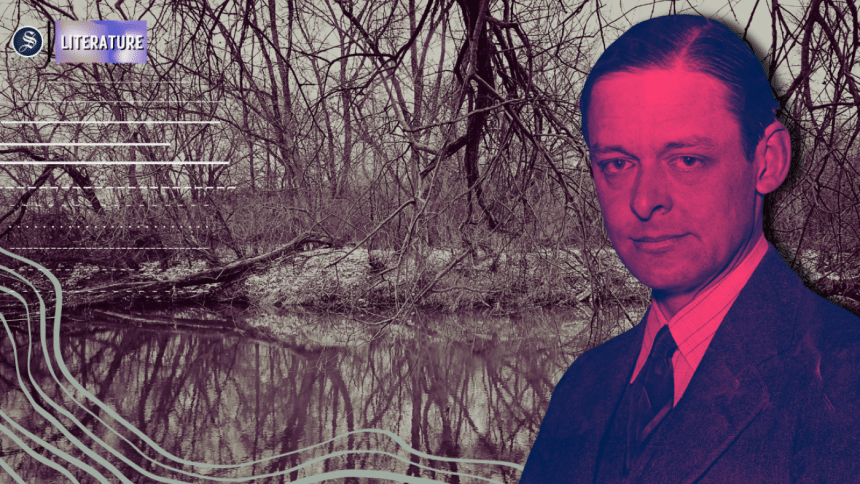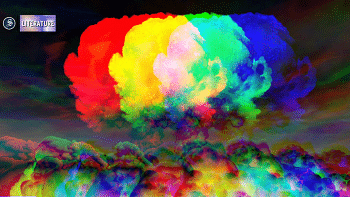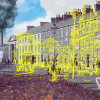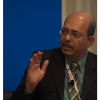T.S. Eliot and on living in unreal cities

Langdon Hammer, Professor of English and American Studies at Yale University, once described T. S. Eliot's "The Waste Land" as, "A monument, but no monument anyone had seen before, since it arrived in ruins." In broad strokes, this is perhaps the legacy of Eliot's greater body of work. This is the legacy of the poet himself, one of the most celebrated and deified icons of the modernist movement, known most popularly for his twisted poetry that always alluded to too many things. There is something visceral here, that much is for sure. But it's impossible to pinpoint the exact elements in Eliot's work that made him the face of modern poetry. It's impossible… and yet, I always find myself coming back to one phrase in "The Waste Land", a phrase not wholly original, taken from Charles Baudelaire and given new life: Unreal City.
Though the poem was written one hundred and one years ago in a land I have never visited, something about Eliot's bursts of images portraying London as a decrepit landscape crowded with sighing people resonates with me every day. Is it that his study of the Bhagavad Gita and the Upanishads inspired his literature to perform as a connective tissue for literature across continents? Perhaps, but a deeper truth exists in the disjointed nature he presents so much of his work in. I once again find myself drawn to "The Waste Land"—though this isn't about just the one poem, not really—where so much of the old world exists in motifs in a tattered landscape. The connective tissue here is not the literary references, but the sensation of disjointedness that permeates modern society.
From the core of our daily lives, the rot of alienation consumes us. In my experience, loneliness, foreboding and overwhelming, comes with crushing waves of people sighing and yelling, but never truly looking at each other. It all piles up as one tragedy—be it personal or otherwise—befalls another until everything collapses and what we are left with is living on in the ruins. "The Waste Land" is much the same—it's a tale that functions like a patchwork of other stories, given new life and new meaning. And even if that isn't the meaning derived by others, how can one deny the cruelty that has followed the Industrial Revolution?
When I think of T.S. Eliot, I am always reminded of the Unreal City in his poem. A bit more than that, though, I am reminded of emotions and monologues largely incoherent, but never nonsensical. To go a step further, I am reminded that Eliot is most profound when his words are laced with the anxiety of living. But to say that is all he is would be categorically untrue. He is not void of charm and even displays sprinkles of whimsy in his book Old Possum's Book of Practical Cats. Not just that, Eliot was also a literary critic—and a rather well-known one at that. When I think of Eliot, I often do not think of all that, but to understand him all of these facets must be looked at. The champion of modernism was a lot more than the author of a handful of poems that changed the world—wading the waters to discover the truth of T.S. Eliot is an ordeal many have spent much of their lifetime over. The result? It's not always a pretty picture.
The fact that Eliot held anti-semitic views and was not very subtle about it in poems like Gerontion is worthy of note. Moreover, for much of his career, Eliot was antidemocratic and antiliberal. How then, do these pieces of information reshape our understanding of his work? I find it most fascinating to read Eliot with the purpose of understanding how his views may have informed his literature. There is no answer to understanding Eliot, there is merely the effort of piecing together many streams of consciousness into one mosaic model. Not to deify the person, but to understand the words that spearheaded the collapse of the traditional ways of poetry.
Prufrock served as the first poem I read from Eliot. My immediate reaction to it at the time was, "This is an incredibly insecure man." I was somewhat younger and far more inexperienced with poetry, but I doubt my assessment would be all that different even today. It's a beautiful piece that laid the groundwork for what would follow in his career, but it was also a poem that felt more like an internal meltdown than a coherent narrative. This has always been the mental image of Eliot in my head, and perhaps this is what has led to my curiousity in his work. And maybe this curiousity is something I am not alone in.
Raian Abedin is a writer and a poet with a passion for capturing in words the many lives people lead, and the bizarreness hidden in everyone's normality.

 For all latest news, follow The Daily Star's Google News channel.
For all latest news, follow The Daily Star's Google News channel. 











Comments